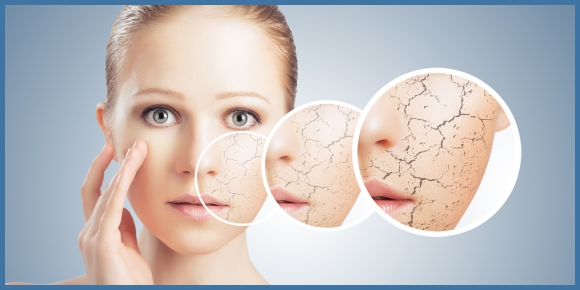Articles
The Beginner’s Guide to Dry Skin Care
The Beginner’s Guide to Dry Skin Care
Skin dryness is a common problem. It can be caused by many different factors and should not be taken lightly. Skin dryness, coarse skin, and dehydrated skin are never normal. If the skin is dry and rough, that can lead to other conditions such as itching, cracking, bleeding, or even infections.
Dry skin occurs when the outer layers of the epidermis become dehydrated. This condition can occur because the skin does not produce enough oil or retain moisture well enough. There can be many causes of constantly dry skin and many ways to treat this condition.
Causes of Dry Skin All Over Body
Noticing coarse or cracked skin on the face, arms, legs, or heels? There might be some underlying causes. The most common body dryness causes are ageing or sun exposure. However, it can also be caused by long-term medical conditions like diabetes or kidney disease. Here are a few possible causes of dry skin:
1. Ageing – As we age, our skin loses its natural moisture and can become dry and scaly.
2. Chronic Kidney Diseases – If you have a condition that affects your kidneys, this could cause your body to lose vital nutrients like potassium, which are essential to maintaining a healthy moisture balance to the skin.
3. Diabetes can cause the skin’s blood vessels to narrow, making it hard for blood to get through to the cells below where it needs moisture.
4. Over-the-counter (OTC) medications, such as aspirin, ibuprofen or antihistamines, are mostly bought without any medical supervision. Therefore, intake of such OTC medicines may result in dry and flaky skin.
Some other environmental factors include:
5. Beauty products: Most beauty products contain harsh chemicals which can lead to severe skin damage in the long run. These chemicals strip the skin of moisture and make it drier than ever before.
6. Long hot showers: Hot water tends to dry the skin by removing its natural oils. Shower with warm or tepid water for a few minutes and then turn it into the cold for 15 seconds or so as this will cleanse your pores thoroughly without draining away all the moisture from your body. The cold water helps to close up the pores and locks in all the moisture inside the body. This helps retain moisture in the body and prevents you from getting dry-skinned quickly.
7. Cold weather: One of the most common causes of dry skin patches on the body is frosty weather. The low humidity levels in such icy-cold weather can cause dryness on all body parts, including hands, feet and face.
8. Sun Exposure: Also, over time, the sun’s rays can damage the skin’s elasticity, making it more prone to wrinkling and getting thinner and drier.
Dry Skincare Routine
You should follow a strict skincare routine to keep your skin glowing and moisturized all the time. Most people have just a single AM-to-PM skincare routine, but instead, there are two regimes, i.e., morning and night – which must be followed rigorously if you are looking to manage dry skin. Here are some tips and a detailed morning and night skincare pattern to help you.
Morning Skincare Routine for Dry Skin
1. Cleansing Lotion for Dry Skin – Start with a mild cleanser that doesn’t strip your skin of its natural oils – this will help keep your skin moisturized. Choose a cleansing lotion specifically designed for sensitive skin or cold weather dry skin. Apply Cleanser to damp face using circular motions. Rinse with warm water and pat dry with a soft towel.
2. Toner – Toners are used after cleansing to help remove any makeup residue and excess oil from the face. Of course, you want to choose a balanced toner for your skin type.
3. Antioxidant Serum – The antioxidants in our serum help fight free radicals in the skin caused by sun exposure, pollution and air conditioning. Free radicals cause skin damage, accelerated aging, wrinkles, and even skin cancer when exposed to too many over time.
4. Apply Moisturizer With SPF – The best way to combat dry skin is to moisturize regularly. This will keep your skin soft and supple, helping to reduce the appearance of fine lines and wrinkles. In addition, moisturizer with SPF keeps your skin looking young and healthy as it protects against sun damage. In addition to protecting against UV rays, moisturizers can help heal the damage done by the sun’s harmful rays while simultaneously restoring moisture content to soften and smooth your skin.
Night Skincare Routine for Dry Skin
You need to hydrate it well for dry skin, and nighttime is the best time to do this. You can use a cleansing lotion and toner at the end of the day before going to bed. Apart from this, use –
1. Facial Serum: This is a very popular ingredient in many moisturizers as it improves the texture of your skin and helps reduce wrinkles. Facial serums are a type of skincare product designed to target specific concerns with the skin, like aging, acne, or general skin damage like cracked skin on the face. They usually contain higher concentrations of active ingredients than moisturizers, making them more potent in addressing specific concerns.
2. Eye Cream: The skin around your eyes is one of the most delicate and sensitive on your face. It’s also the first place to show signs of aging and skin damage. Because the skin around your eyes is so thin, it’s essential to carefully choose an eye cream that is not too thick or heavy and won’t clog your pores. If possible, look for one containing retinol and vitamin C; they help reduce under-eye puffiness, dark circles, and fine lines. Also, be sure to apply it gently with small circular motions.
3. Hydrating Moisturizer: Dry skin needs layers of moisture to feel supple and soft. Applying a hydrating moisturizer on an oil-based serum or lotion is an excellent way to add hydration to the skin. The best time to use this moisturizer is at night, as it will get absorbed into your skin while you sleep! Then, wake up with beautifully hydrated and supple skin!
#Bonus Tips to get rid for Dry Skin Forever
- Try to keep your skin moisturized. Apply mild creams and lotions containing vitamin E, which helps prevent water loss from the skin.
- Massage your body with lightweight oil like jojoba oil, coconut oil, or almond oil before taking a shower or bath.
- Put a humidifier in your bedroom at night. This will help keep the air moist and eliminate the dryness that makes it difficult for you to sleep well.
- Do not scratch dry and /cracked skin on legs/ as this will only make them worse and may lead to infections and rashes.
- Usually, there is a lot of dead skin on the face and hands that get transferred to your bed while sleeping. Change your bed linens every two weeks or more often if needed. This will help to get rid of the dead cells on your bedspread.
Takeaway
Dry skin can be an extremely frustrating and uncomfortable condition. However, the good news is that there are effective ways to deal with dry, flaky skin. Hopefully, after reading this article, you are empowered to change how you look at your dry skin and take better care. Furthermore, you should be equipped with enough knowledge regarding causes of body dryness and tips to start taking care of your dry skin issues like coarse hands, cracked legs, and dehydrated skin.


